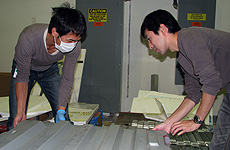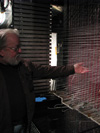KTeV crystals to shine again

JPARC graduate students work to pack crystals from Fermilab's former KTEV experiment for shipment. JPARC will use the crystals in an experiment that will look for ultra-rare kaon decays.
From 1997 to 1999, scientists at Fermilab conducted an experiment using the most accurate energy-measuring device ever built for high-energy physics.
Then researchers carefully stored the experiment, KTeV.
Until now.
Graduate students from the Japan Proton Accelerator Research Complex, or JPARC, arrived last Wednesday to help package the 3,100 crystals stored in KTEV's detector for shipping to Japan. The detector's crystals are the key to its sensitivity. They are made of cesium iodide, a heavy and transparent compound that has the density to stop a particle and the ability to generate and conduct light. Scientists from JPARC will use the crystals at in an experiment complementary to those that will be performed at the Large Hadron Collider.
Researchers at JPARC will study ultra-rare kaon decays, outcomes that occur a few times in a hundred billion collisions.
"Rare decays are a very stringent test of the Standard Model," said Hogan Nguyen, PPD Technical Centers Department head. Learning more about the parameters of particle decay will help scientists better understand what they find in collisions in the LHC.
The KTeV experiment used the crystals to measure energy from photons and electrons, Nguyen said. When the particles enter the crystals, the interaction between the crystal and the particles puts the crystals into an excited state. As the crystals de-excite, they emit near-UV light. Photomultipliers measure the electric current the interaction generates.
 |
| Ray Safarik, a technical specialist at Fermilab, shows the partially dismantled KTEV detector. |
Moving the crystals will save both institutions money.
Sending the crystals to Japan relieves Fermilab of the responsibility of maintaining the sensitive crystals in a useable state and saves Japan from having to purchase new parts.
The materials that make up the detectors cost about $6 million in 1993, said Ray Safarik, a technical specialist at Fermilab who has been coordinating the move.
"They would cost considerably more today," he said. But transporting them to Japan for reuse costs less than $80,000.
The ongoing move began in spring of 2007.
-- Kathryn Grim
|